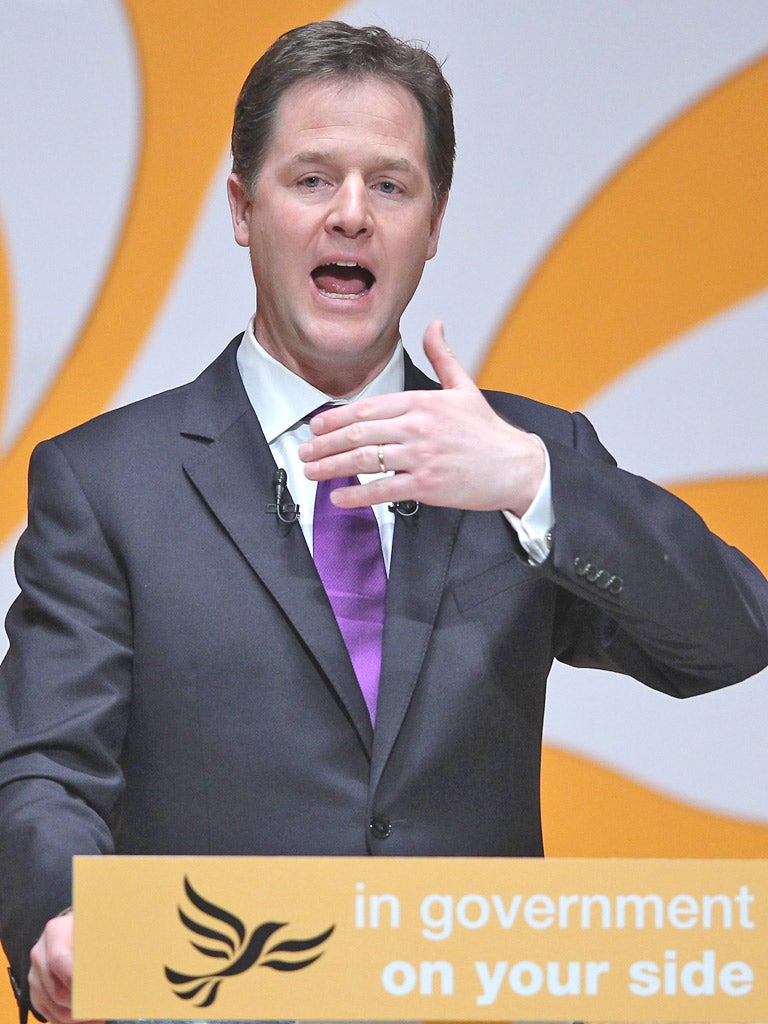Political apathy hits a new low – especially if you're a Lib Dem
The public is more disgruntled than at any time in the last decade, a new survey reveals

Your support helps us to tell the story
From reproductive rights to climate change to Big Tech, The Independent is on the ground when the story is developing. Whether it's investigating the financials of Elon Musk's pro-Trump PAC or producing our latest documentary, 'The A Word', which shines a light on the American women fighting for reproductive rights, we know how important it is to parse out the facts from the messaging.
At such a critical moment in US history, we need reporters on the ground. Your donation allows us to keep sending journalists to speak to both sides of the story.
The Independent is trusted by Americans across the entire political spectrum. And unlike many other quality news outlets, we choose not to lock Americans out of our reporting and analysis with paywalls. We believe quality journalism should be available to everyone, paid for by those who can afford it.
Your support makes all the difference.Plato said that those who are too smart to engage in politics are punished by being governed by those who are dumber.
And it appears that, more than 2,300 years later, the British electorate entirely concurs. A new study published today reveals that the public is more disgruntled, disillusioned with and disengaged from politics than at any time in the past decade.
The research by the Hansard Society shows that less than half the population is now interested in politics at all and one in three is unlikely or certain not to vote at the next election.
It concludes that coalition politics "does not appear to have been good for political engagement".
The study found that dissatisfaction with politics is particularly evident among Liberal Democrat supporters.
A year ago 72 per cent of Liberal Democrat voters said that they were interested in politics but that has now fallen to just 50 per cent. The number of Conservative supporters interested in politics has fallen to 65 per cent while Labour support has dropped 12 points to 48 per cent.
The study also suggests there has been a striking decline over the past two years in the proportion of the public undertaking voluntary work. One person in five says they would be prepared to work for free in their communities, down from nearly 30 per cent in 2010 – a finding which the Hansard Society said represented a "worrying development" for the Big Society.
Many voters see a strong disconnection between what happens in Parliament and its effect on individuals lives. Only 24 per cent of people think the system of governing works "reasonably well" while just 38 per cent agree that the Government is held to account by Parliament.
Dr Ruth Fox, director of the Hansard Society's Parliament and Government programme, described the findings as "worrying".
"2011 was one of the most turbulent and momentous years in recent history," she said. "But it appears that the economic crisis, the summer riots and phone hacking did not lead to any greater interest in or knowledge of politics.
"The public seems to be disgruntled, disillusioned and disengaged. Thus far, coalition politics does not appear to have been good for public engagement.
"Only a quarter of the population is satisfied with our system of governing, which must raise questions about the long-term capacity of that system to command public support and confidence in the future."
Tim Farron, president of the Liberal Democrats, said he thought that the findings could be related in part to the economic hardships of the last few years. But he added it was incumbent on politicians to "win people's trust back".
"In a time of serial bad news it is perhaps not surprising that people are dissatisfied with the political process," he said. "And to be involved in politics at a time like this is testing, and it is no fun at all to be steering the country through a period of austerity.
"But it is vital that as politicians we keep trying to engage with people and win their trust back – not through relaunches but through determined attempts to prove that we are working in the public good over a period of time."
In numbers
48% The percentage of the electorate who say they are certain to vote at the next general election, down 10 per cent on last year.
42% Proportion of population now interested in politics, down 16 per cent on 2011.
22% The decline in support for Lib Dems – the biggest drop among the parties.
45% The proportion of Labour supporters who say they are knowledgeable about politics.
Join our commenting forum
Join thought-provoking conversations, follow other Independent readers and see their replies
Comments